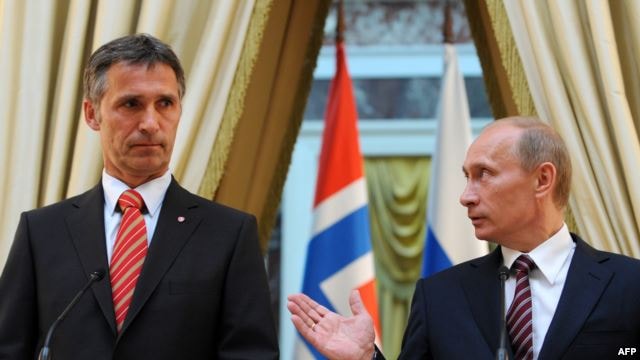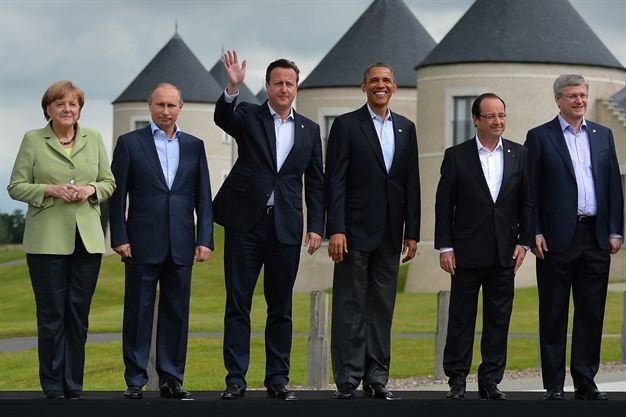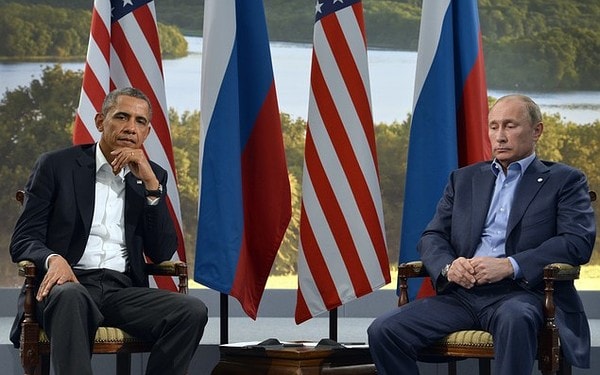Russia - NATO Relations: Broken Mirror About to Be Healed?
(Baonghean) - Last weekend, some positive signals came to the Russia - NATO relationship, which has been full of animosity and difficulties. That is the information about the possibility of the Russia - NATO Council meeting in the near future; or the statement of the German Foreign Minister saying that the G7 countries will consider letting Russia return to the G8 group. These are considered signals of "thawing" the relationship that has been in a state of tension for the past 2 years. But will this thawing path be smooth?
 |
| Russian President Vladimir Putin (right) and NATO Secretary General Jens Stoltenberg (left) (Source: AFP) |
No surprise attitude
In a recent statement, both the North Atlantic Treaty Organization (NATO) and Russia announced that the Russia-NATO Council will meet within the next month. Accordingly, Mr. Andreï Keline, Director of the Department of European Cooperation under the Russian Foreign Ministry, said that the two sides are currently working to plan the time, location and agenda of the meeting. The Russian diplomat also emphasized that meetings of the Russia-NATO Council are very important to re-establish dialogue between the two main security factors in Europe.
Meanwhile, on the NATO side, the organization's representative said that the two sides have agreed to hold this meeting at the ambassadorial level. NATO Secretary General Jens Stoltenberg emphasized that this will be the first meeting of this council since the interruption in 2014, which is expected to be a positive "thaw" signal between the two sides. In another development, before the G7 Foreign Ministers' Meeting - the group of countries with the world's largest economies taking place in Japan, German Foreign Minister Frank-Walter Steinmeier said in a statement that the G7 group is considering Russia's role in resolving international conflicts and will decide on the conditions for Russia to return to the G8 group as before.
 |
| Russian President Putin attends the 2013 G8 Summit in Northern Ireland (UK). (Source: AFP) |
It is no coincidence that NATO has recently made many statements of reconciliation and wanting to warm up relations with Russia. It is understandable that NATO countries, although allies of the US, do not always agree on views on all issues. People even see a rift within this bloc between the US on one side and European countries on the other. Because since the decision to cancel military and civil cooperation with Russia after the annexation of Crimea into Russia, followed by a series of measures to blockade and embargo Russia, the European economy has also suffered significant damage. Meanwhile, NATO also understands and is very wary of Russia's military power; it has even had to admit that it is one step behind Russia. Therefore, not every enticement from the US makes the entire NATO bloc follow. Therefore, many times, the top leaders of Germany or France have suggested reducing sanctions against Russia.
Shaking hands is not easy
It was thought that once goodwill was there and both sides' interests were achieved, the path to normalizing Russia-NATO relations would be easier. But the reality is not that simple!
 |
| US President Barack Obama (left) holds talks with Russian President Vladimir Putin on the sidelines of the G8 Summit in 2013. (Source: AFP) |
First, the problem lies primarily with Russia. In a statement, Russia's Special Envoy to the North Atlantic Treaty Organization (NATO) Alexander Grushko said that relations between the two sides will not improve as long as the military alliance continues its "containment policy" with Moscow. And that public opinion should not expect too much from a breakthrough in bilateral relations. Thus, suspicion still exists. From another perspective, many analysts believe that Russia is currently in a "superior position" compared to NATO because NATO needs Russia more, and Russia's position in international records is undeniable. Therefore, the G7's consideration of Russia's return to the G8 does not make Russia too concerned. And Russia will also have ways to get NATO to make more concessions to it on many issues.
Second, the "stumbling block" is within NATO between the US and European countries. Although the US also needs Russia to resolve international issues, the fact that its European allies are following Russia has inevitably made the US worried. Therefore, public opinion is "guessing" that the Panama Papers that have been causing a stir in recent days are actually the US behind them to target the Putin administration. Meanwhile, in response, Russia is not pleased when over the weekend, RT News Agency released information about a survey showing that 40% of Iraqis believe that the US is supporting the self-proclaimed Islamic State (IS) to cause instability in the country. According to RT, this belief is reinforced by reports and videos showing the various forms in which the US has supported IS militants. Not only that, on April 8, Sputnik also interviewed Iraqi journalist Muntazer al-Zaidi, in which it presented evidence accusing the US Air Force of parachuting supplies and weapons to IS.
It is not yet known who is right and who is wrong in these accusations, but clearly, these developments are deepening suspicion and escalating tensions not only between the two countries but also between Russia and NATO. Therefore, experts predict that perhaps the Russia - NATO relationship will remain difficult at least until the end of 2016, and will not soon be "broken mirrors mended" as many people expect.
Phuong Hoa
